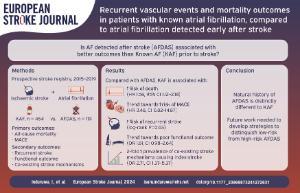Congratulations to UCD School of Medicine’s Dr John McCabe, Dr Sarah Gorey, and  Professor Peter Kelly and all the research collaborators on their recently published research on Plasma fibrinogen and risk of vascular recurrence after ischaemic stroke: An individual participant and summary-level data meta-analysis of 11 prospective studies in the European Stroke Journal.
Professor Peter Kelly and all the research collaborators on their recently published research on Plasma fibrinogen and risk of vascular recurrence after ischaemic stroke: An individual participant and summary-level data meta-analysis of 11 prospective studies in the European Stroke Journal.
Inflammation is an emerging target for secondary prevention after stroke and randomised trials of anti-inflammatory therapies are ongoing. Fibrinogen, a putative pro-inflammatory marker, is associated with first stroke, but its association with major adverse cardiovascular events (MACE) after stroke is unclear.
We did a systematic review investigating the association between fibrinogen and post-stroke vascular recurrence. Authors were invited to provide individual-participant data (IPD) and where available we did within-study multivariable analyses with adjustment for cardiovascular risk factors and medications. Adjusted summary-level data was extracted from published reports from studies that did not provide IPD. We pooled risk ratios (RR) by random-effects meta-analysis by comparing supra-median with sub-median fibrinogen levels and performed pre-specified subgroup analysis according to timing of phlebotomy after the index event.
Eleven studies were included (14,002 patients, 42,800 follow-up years), of which seven provided IPD. Fibrinogen was associated with recurrent MACE on unadjusted (RR 1.35, 95% CI 1.17–1.57, supra-median vs sub-median) and adjusted models (RR 1.21, 95% CI 1.06–1.38). Fibrinogen was associated with recurrent stroke on univariate analysis (RR 1.19, 95% CI 1.03–1.39), but not after adjustment (RR 1.11, 95% CI 0.94–1.31). The association with recurrent MACE was consistently observed in patients with post-acute (⩾14 days) fibrinogen measures (RR 1.29, 95% CI 1.16–1.45), but not in those with early phlebotomy (<14 days) (RR 0.98, 95% CI 0.82–1.18) (Pinteraction = 0.01). Similar associations were observed for recurrent stroke.
Fibrinogen was independently associated with recurrence after stroke, but the association was modified by timing of phlebotomy. Fibrinogen measurements might be useful to identify patients who are more likely to derive benefit from anti-inflammatory therapies after stroke.